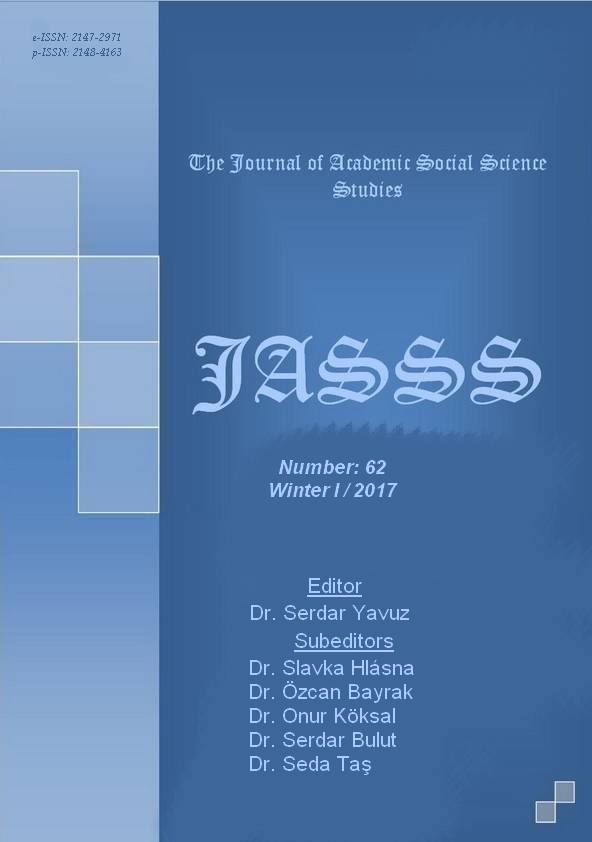Author :
Abstract
Türkçe yazmanın serüveni çok eski dönemlere kadar gitmektedir. Türklerin kullandığı Göktürk alfabesi, Türkçeye son derece uygun olup olgunluk seviyesine ulaşmış bir alfabedir. Fakat özellikle Türklerin Anadolu’ya gelmesinden sonra Türkçe yazıda fetret denebilecek bir dönem yaşanmıştır. Bu dönemde Anadolu’da eser veren bazı şair ve yazarlar, Türkçe yazdıkları için özürlerini ve mahcubiyetlerini dile getirmişlerdir. Bu şahsiyetlerin Türkçeye mesafeli durması ve Türkçeyi âvâmın dili olarak görmesi, Türkçeyle ilgili dönemsel bazı negatif yaklaşımların varlığına işaret etmektedir. Ömrünün uzun bir kısmını XIII. Yüzyılda yaşamış olan Âşık Paşa, Garîbnâme adlı eserinde Türk diline kimsenin itibar etmediğinden yakınmıştır. Bunun yanında Çağatay sahasının XV. Asır şairlerinden Ali Şîr Nevâî, Türkçe yazma gayretini ömrünün sonuna kadar bilinçli ve şuurlu bir dava adamı olarak sürdürmüştür. Nevâî’nin Muhâkemetü’l-lügateyn gibi büyük bir eseri yazması, onun Türkçe için çırpınışlarını göstermektedir. Bu bilinçte olan bir aydına bile Hüseyin Baykara ya da Molla Abdurrahman Câmî gibi büyük şairlerin Farsça yazması için ısrarcı olup telkinde bulunmaları, aydın üzerinde çevre ya da entelektüel baskı faktörünün ne denli etkili olduğunu göstermektedir. Bu dönemde Hindistan’dan Mısır’a; Orta Asya’dan Anadolu’nun batısına ve hatta Balkanlara kadar geniş bir coğrafyaya dağılıp irili ufaklı gruplar halinde yaşamlarını sürdüren Türklerin dilinin bu şekilde ötekileştirilip yeteri kadar rağbet görmemesinin temelinde acaba hangi sebepler yatmaktadır? Şair ve yazarlar neden böyle bir yaklaşım içindedir? Böyle bir düşünüş aslında neye işaret etmektedir? İşte bu çalışmada bahsedilen bütün bu sorulara cevaplar aranmıştır. Çalışmada metinlerarası okuma metodu uygulanmış, Anadolu’da XIII. Yüzyıldan XVI. Yüzyıla kadarki zaman diliminde yazılmış Türkçe eserler ve yazma metinler incelenmeye çalışılmıştır. Tespit edilen ilgili örneklerden hareketle belirtilen sorulara cevaplar aranmıştır. Neticede görülmüştür ki, dönemsel siyasî ve politik olaylar, Arapça ve Farsçanın edebiyat ve bilim mahfillerindeki aktüel gücü, Türklerin yaşam şekilleri gibi sebepler, Türk ve Türkçe ile ilgili bir imajın oluşmasında etkili olmuştur. Bu imajın bazı dönemlerde negatif olması, hevesli olsalar bile şair ve yazarların Türkçe eser yazmasını etkilemiştir.
Keywords
Abstract
The adventure of writing in Turkish language goes back to very old eras. Gokturk alphabet is highly appropriate for Turkish language and it has reached to saturation level. However, there was a period which could be named the fatrat of Turkish literary (weakness or numbness of Turkish literary), especially after coming of the Turks to Anatolia. Some poets and writers who wrote in Anatolia during this period expressed their apologies and embarrassment for writing in Turkish. Staying away of these people from the Turkish language and their approach which Turkish seen as a language of ordinary people are sings of existence of periodical and historical negative approaches. Ashiq Pasha who lived most of his life in the 13th century, complained about lack of interest of people to Turkish language on his work entitled Garib-nama. Also, Ali Sheer Nawai continued his life as a man with a cause and conscious until the end of his life with the efforts of writing in Turkish language in Chagatay area in 15th century. Nawai’s great manuscript which entitled Muhakamatu'l-lugatayn shows his efforts for Turkish language. He was an awareness man andsome great poets like Husain Bayqara or Molla Abdurrahman Cami tried to even insist him on the matter of writing poets with Persian language. This shows how the environment and intellectual factors were dominant on the poets. Turks have continued their lives with small or large groups in a wide geographical area began from India to Egypt; from Central Asia to the west of Anatolia and even up to the Balkans in this period. What are the reasons behind unpopularity and exclusion of Turkish language? Why poets and writers had such these perceptions? What such these thoughts signs for? All these questions will be answered in this study. Intertextual reading method was used in this study. The Turkish classics and manuscript texts of the period from 13th century until the 16th century in Anatolia were examined. Stated questions were answered from these detected relevant examples. Therefore, there has been seen such reasons like seasonal political events, the actual power of Arabic and Persian literature in the literacy places and science, the forms of the life of the Turks etc. These reasons were effective on the formation of these thoughts. This negative image in some period has affected the poets and writers to write in Turkish even if they are enthusiastic.
